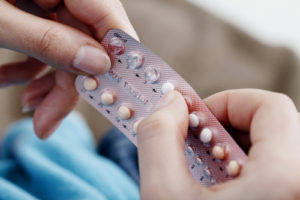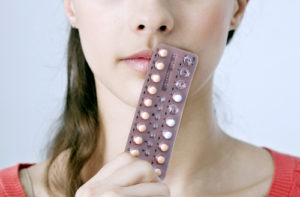Back to Contraception List
Combined Contraceptive Pill
The combined pill is up to 99% effective if used properly. The pill has a very high failure rate if it’s not used correctly. The pill is a tablet form of contraception that has two hormones contained in it. These hormones stop the female ovulating monthly (HSE, 2017). They also thicken the fluid (mucus) at the cervix so sperm cannot enter the womb, and alter the lining of the womb to make it less likely to accept a fertilised egg (IFPA, 2017). There are many different types of pills with different combinations of hormones. You can discuss these options with your GP/doctor or make an appointment with the Student Health Nurse.
You need to take the pill every day for 21 days, then stop for seven days, and during this week you have a period-type bleed. You start taking the pill again after seven days. It is important that you take your pill at the same time, every day.
Benefits of choosing the pill
- Does not interrupt sex.
- The pill is very useful for females who can reliably take a pill on a daily basis.
- Can often reduce the heaviness of a period and pre-menstrual tension (PMT).
- Can potentially protect against cancer of the ovaries and the womb.
Disadvantages of choosing the pill
- Minor side effects include mood swings, breast tenderness and headaches.
- The pill does not protect against STI’s.
- Some medication such as antibiotics can stop the pill from being an effective method of contraception therefore its recommended that another method should be used if taking medication.
- If experiencing vomiting or diarrhoea, the pill may not be an effective method of contraception therefore its recommended that another form of contraception be used.
- There’s a very low risk of serious side effects, such as blood clots and cervical cancer.
- The pill is only available by prescription.
- If you have a history of high blood pressure, migraines or if you are a smoker over the age of 35 the pill may not be the best contraception for you. The GP at the Student Health Services at IT Sligo can advise you on methods of contraception that is most suitable for you (HSE, 2016)
For more information on the combined pill, click on any of the following links;
Factsheet- Think Contraception
Mini Pill/Progesterone Only Pill
 The mini pill/pop is 96-99% effective with very careful use. There are two types of progestogen-only pills available in Ireland, Noriday and Cerazette, which differ in the way they work and instructions for what to do if you miss a pill (IFPA, 2017).
The mini pill/pop is 96-99% effective with very careful use. There are two types of progestogen-only pills available in Ireland, Noriday and Cerazette, which differ in the way they work and instructions for what to do if you miss a pill (IFPA, 2017).
The mini pill is a tablet form of contraception that contains the hormone progesterone. It prevents pregnancy by stopping the males sperm from getting through the females cervix.
When choosing which pill you choose, it is important that you talk to a doctor/nurse who will assess what contraceptive option is best for you. The Student Health Nurse at I.T. Sligo is more than happy to discuss what would suit best for you.
Benefits of choosing the mini pill
- It is a very effective method when used correctly
- May help with pre-menstrual tension and painful periods
- You can use it at any age
- You can use it if you are over 35 and you smoke (not advised with combined pill)
- May be an alternative for women who cannot take the combined pill
- Does not interrupt sex
- Useful for females who can reliably take a pill on a daily basis
- The progesterone only pill can be used by woman who can’t use contraception that contains oestrogen for medical reasons
- The mini pill can be used during breastfeeding (HSE, 2017) (IFPA, 2017)
Disadvantages of choosing the mini pill
- Must be taken daily at the same time. Other contraception may be required if pill is taken more than three hours late.
- Some medications can stop the pill from being an effective method of contraception therefore its recommended that another method of contraception should be used if taking medication.
- If experiencing vomiting or diarrhoea, the pill may not be an effective method of contraception therefore its recommended that another form of contraception be used.
- The mini pill can make your periods stop, or become lighter, irregular or more infrequent.
- The mini pill is only available by prescription.
- The mini pill does not protect against STI’s.
- It may cause weight gain (HSE, 2017) (IFPA, 2017).
For more information on the mini pill, click on any of the following links;